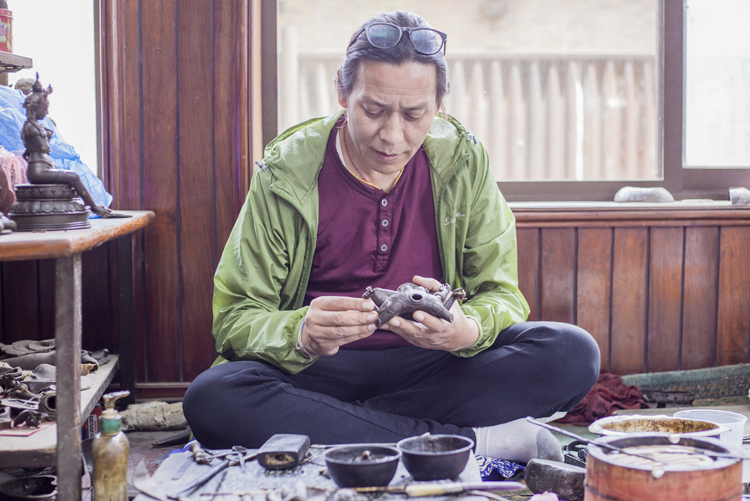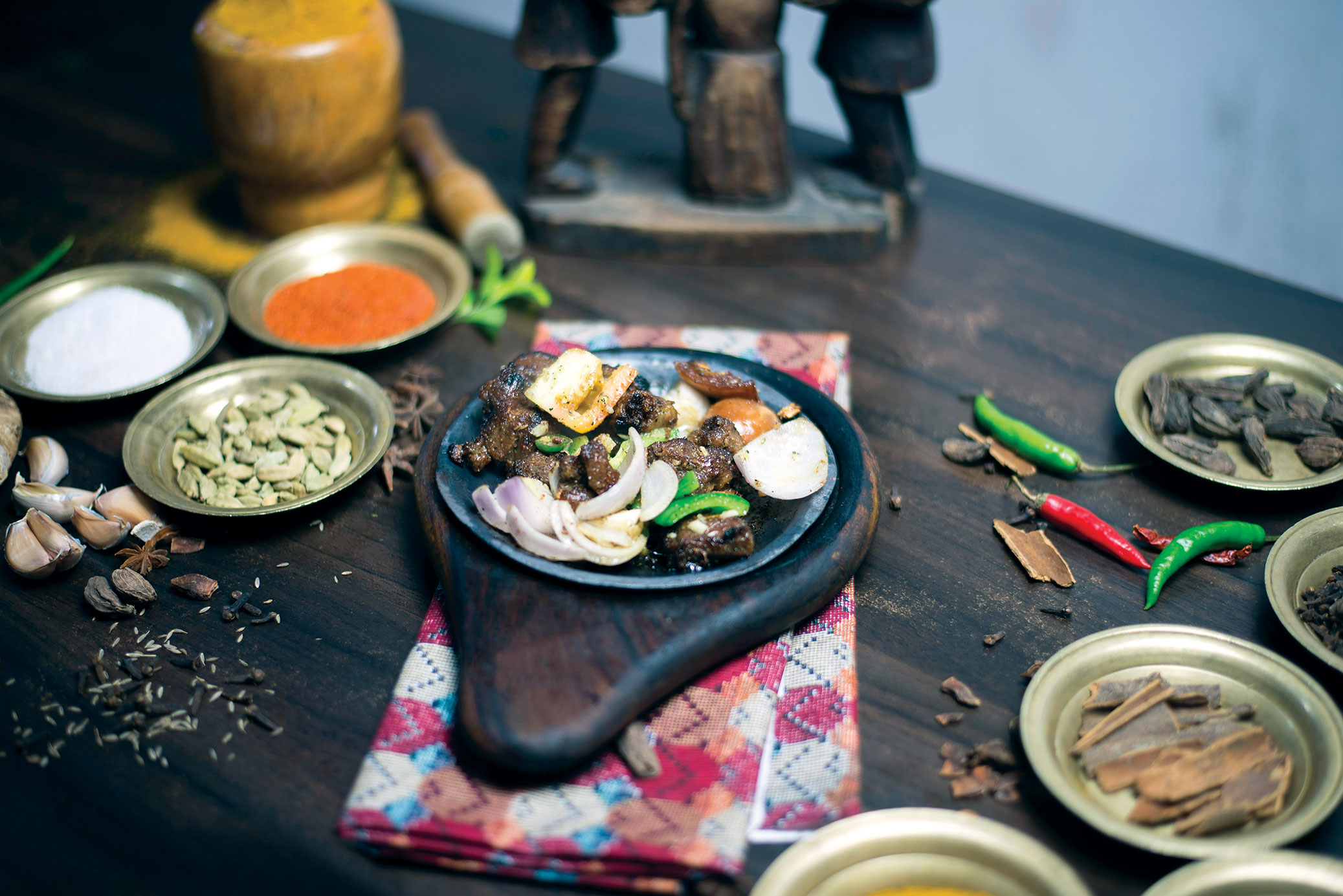The common English term for Janai is ‘sacred thread’ because threads are all it is. However, it holds deeper social and religious significance for males belonging especially to the Brahmin caste.
In a Hindu society, Brahmins are unique. Apart from the matters of daily life, they also have to deal with affairs that are distinctly Brahmanical. The gradual shift in the cultural and social values and dramatic change in lifestyles, however, have made it difficult for them to hold on to their customs that date back to pre-historic times. One of these customs is wearing janai (the sacred thread), and strictly abiding by its tenets.
A janai is comprised of loose, hand-woven cotton threads braided together and held together by a knot. The common English term ‘sacred thread’ is because threads are all it is, and sacred because it is worn after an elaborate investiture ceremony with archaic rituals typical to Hinduism.
“So much fuss over a bunch of threads?” one, unfamiliar to this tradition may wonder. But ask a reasonably modern Brahmin lad what this fuss is all about and his tales will leave you baffled.
“The first thing my mother does after I return home after a long absence is slip her hand through my T-shirt collar and feel the thread,” says one young adult Brahmin. “More often than not she ends up disappointed.”
“What did you do to the janai?” she asks him in that chastising tone that tells him it is going to be more than mere interrogation. She does not even hesitate to put a question mark on his very origin. “Have you forgotten that you are a son of a Brahmin!”
Then his mother takes him to task. Without wasting a minute, she sifts through some plastic bags kept in a corner of the prayer room and pulls out a bundle of threads. “Do whatever you want when you are away, but at home you have to wear it,” she says as she thrusts the sacred thread at him.
“I am scared of the sacred thread,” he mutters in a slow voice. She looks at him aghast. “How funny? What is there to be scared about wearing a janai?”
“Oh! Is there only one thing?” he retorts. “A thousand things worry me if I wear it. The mantra, the rituals, the taboos, you name it,” he says, trying to assert himself.
She does not relent. “What with the mantra, rituals and taboos? You don’t spend even five minutes in the morning for the mantras. And rituals? You are a son of a Brahmin and you have to follow them. And why do taboos scare you? Because you cannot eat chicken, pork or alcohol?” she says.
Sons of Brahmins are forbidden from eating meat, except goat, and drinking alcohol is intolerable by all standards. Some of the most pious Brahmins do not eat foods that have onions or garlic in them and many will have never tasted mushroom. After wearing janai, of course, the Brahmin lads fall under more stringent obligations.
The young man is a teetotaler and a vegetarian, so the taboos are certainly not the issue. “My problem,” he says, “is my faith.”
“I totally believe in the sacredness and inviolability of the sacred thread. But, my work takes me places and I often visit places hostile to the practices associated with the symbolism of the sacred thread, the janai. And all too often doing nearly anything can easily breach the taboos and violate the thread’s sanctity.”
“Wearing the thread, you have to be careful about what you eat and where,” he says, hinting at the taboos associated with caste. “I often travel to remote locations where food is cooked and served neither appropriately, nor by appropriate people.” (There are some people from whom, by ageless tradition, Brahmins are not supposed to take cooked food.) “In such places,” he goes on, “I find spinach, cabbage and cauliflower being cooked in the same pot used for cooking pork and chicken, and where water and tea are served in the same glass in which alcohol has been served. Do I have a choice? Faced with such situations, I have had to make ‘difficult choices’ several times.”
“My father wouldn’t let me in if he found that I came home after drinking alcohol or eating pork,” he says. “So each time I am forced by circumstance to transgress the edicts set for a janai wearer, I suffer pangs of repentance. After all, I am the son of a Brahmin.”
To placate this overwhelming sense of fear of the sacred thread, he has made it a point to seek opinions of other Brahmins when he finds them at places inappropriate for strict Brahmins. “What? You repent over such a trifle matter?” one of them told asked. “It is simple. Once you are away from home, hold back on the rituals and shake off the stigmas brought on by the breach of the edicts of the sacred thread. Look at me. I eat to my heart’s content and never ever feel even a trace of guilt.”
The young man looked at him disgustingly and said, “What sort of Brahmin do you think you are? Don’t you fear the wrath of…”
.jpg)
A Brahmin boy after completion of his janai investiture ceremony
“Wrath of...? Whose wrath? What wrath?” his friend cut him short.
“Wrath of...” – he fumbled for a few seconds trying to find the scariest of the gods; but all he managed to say was “...of some god, some heavenly force. I don’t know. But aren’t we supposed to be scared of somebody when we do something wrong?”
“Don’t you know that our is the slackest of all religions?” the other Brahmin replied slyly. “Why, there is always some way or another to absolve you of sin. If you happen to eat or drink or for that matter even touch anything that is against the precepts of the janai, all you have to do is keep a bottle of water from the sacred Ganges river and whenever you are at home you sprinkle a few drops over yourself and you are the same pure Brahmin again.”
He also suggested an alternative. “In case you don’t have water from the Ganges,” he said, “fill a glass with water and touch it to gold – an ear ring, a necklace, a bracelet, anything and then sprinkle the water over you. That works, too.”
Another Brahmin on another occasion told him that he never bothered about sprinkling water. “Who knows whether we have Ganga water at home or not? And I don’t want to raise suspicion or fuss over what I ate or drank or touched while I am away by asking for something made out of gold,” he said.
“So what do you do then? Don’t you have any fear?”.
“Indeed,” this other Brahmin countered, “we need to fear the... whatever. But what if we aren’t doing anything wrong?”
Perplexed and somewhat irritated by the casual manner in which the fellow Brahmins treated the meaning of sacred thread, the young man hastened to ask in reply: “But, how is that possible after eating and drinking and touching these things?”
The other Brahmin pulled up his backpack and opened one of the front pockets, thrust his hand inside and pulled out a thread and began to explain. “You see, when travelling away from home and knowing that I am not going to live with my Brahmin relatives or friend, I make it a point to take my janai off and keep it in my bag. When it is time to return home I wear it again. I don’t know if by not wearing the thread I’ll be raising the wrath of any god or not, but I certainly do not want to upset my mother.”
There are several other sons of Brahmin who are at odds with the peculiar customs of the sacred thread.
“When I was first invested with the janai by a priest amidst a huge function, I was probably 16 years old,” recalls yet another of his friends. “That’s late by today’s standard, when I see young boys less than eight wearing theirs.” To him the janai signified an attainment of some degree of maturity, and he thought he was being elevated to the exclusive club of the ‘grown ups’. “But when I saw the kids sporting it who were still being fed by their mothers, I realized it was a serious misinterpretation on my part.”
Prescribed ages for wearing a sacred thread are between eight and 16 year for a Brahmin (priestly caste), 11 and 22 year for a Kshatriya (Chhetri, the warrior caste), and between 12 and 25 year for a Vaishya (business caste). In all cases it has to be invested before marriage.
If a person crosses the age limit he becomes a vratya. Then, he can be ordained only after many days of fasting, worship and drinking water laced with molten gold. The custom of vratya is already obsolete; therefore, these days even the vratyas get the sacred thread without observing a penance. Some are ordained just a few hours before their marriage, where it is not uncommon to hear people saying: “Takla beulo ta naramro dekhinerachha” – “Shaven-headed grooms don’t look good.”
Shaving head or mundan is the very first thing to be done on the day of the sacred thread ceremony. “Many youngsters, including me, do not like mundan,” says one young Brahmin. “A bald head with only the tupee (the tuft of hair at the back of the head, at the crown) dangling at the back makes you look funny. Nobody finds it cool.” Mundan, according to priests, is done for repentance and purity and the tupee signifies wisdom, as all knowledge is accumulated near the crown of the head.
“Then there’s the mantra,” he goes on with a palpable sense of exasperation. After being invested with the janai, each morning one has to hold it with his right hand and draw it close to a flowing water tap, or make a small cup of his palm enough to hold water to soak the thread, and then recite this mantra: “Om bhurbhuwashwaha tatsabiturvarenyum; bhargodevashyadhimahi dhiyoyonaha prachodayata”, which loosely translated is “Oh Sun god, may by meditating about your supreme sin-destroying light we obtain the adorable splendor that will guide our intellect in the right direction”.
I'll be raising the wrath of any god or not, but I certainly do not want to upset my mother."
A janai wearer is introduced to the mantra by the priest who conducts the sacred thread ceremony. “When my priest whispered it in my ear and asked me to repeat it, I flatly refused,” the same young Brahmin laments. “Honestly, I couldn’t make out what he was blabbering. I asked him to repeat it, instead. When he did, I said ‘One more time please’. But there was noise all around and all I heard was his whispering – ‘Pst pst pst pst. Pst pst pst pst.’”
The sacred mantra is called a gayatri mantra and tradition forbids reciting it aloud in front of females or those who aren’t worthy (so-called ‘low caste’ people). The youngster failed to catch anything and found it impossible to repeat. “There were ten other kids waiting,” he recalls. “And, sensing trouble, the priest declared that he would write it out for each of us and we could learn to recite the mantra, in Sanskrit, from our fathers, all of whom were, of course, veteran janai wearers.”
“Another reason for my refusal,” he goes on, “was the fear of making a silly mistake that might infuriate the priest.” And what if the god on whose name the mantra is recited became annoyed and came down on him with full wrath, he thought. “I told myself first I’ll learn it by heart and understand the proper pronunciation of each words of this brainy and mouth-twisting archaic language.”
He says it was only after a week that he could recite the mantra without the fear of raising the wrath of Surya, the Sun God, for he had learned that his mantra praises the virtues of the rays of the sun. “I was curious how younger boys were faring,” he says. “I got hold of one of them after a week or so and asked, how his jap (reciting of mantra in Sanskrit) was going? The boy pulled up his T-shirt to show his bare chest and said, ‘Great! I stopped it a long time ago’.”

A Brahmin priest performing janai-changing ceremony during Janai Purnima
Another thing that bothered him was the practice of tucking the thread around the ear while defecating. “Though I followed this ritual for a long time I had no clue why this was done,” he says. “One day I cornered one of the fellows who was ordained with us. I asked him why it was done. ‘Oh! Stupid,’ he said, with a know-it-all attitude. ‘You do that because you don’t want the thread to touch the holy mess that you create under your arse’.”
His reasoning was difficult to accept, but for Indian style defecating, equally hard to debunk. In want of a better version, I hold on to this logic.
There are some serious symbolisms assigned to the sacred thread. Hindu tradition considers any kind of oblation, rites and rituals performed by a Brahmin who is not wearing a janai to be incomplete, in the sense that it cannot yield the highest attainment.
If the son entitled to perform the last rite of his parents cannot be ordained to the sacred thread for some reason, the tradition is to make him wear a janai made up of kush (a type of grass) and then let him light the pyre.
For example, when the late Indian Prime Minister Rajiv Gandhi, a Hindu, was killed in a bomb blast in 1990, there was a great confusion over the conducting of his last rites. Since Rajiv’s father, Feroze (Khan) Gandhi, was a Muslim, the Muslims wanted Rajiv to be buried; whereas the Hindus wanted him to be cremated. Finally, the majority Hindus won and it was decided that Rajiv would be cremated following Hindu tradition. The problem was that Rahul Gandhi, Rajiv’s only son, did not have a janai because he was never ordained. According to Hindu tradition, the son who performs the antyeshti, last rites, must have one. As the whole world watched on television, Rahul was ordained to janai, right next to his father’s pyre, before he could set it afire.
The sanctity and symbolic importance of the janai pervades every aspect of the life of a Hindu, particularly the son of a Brahmin. While in the past they couldn’t start their formal education without it, even today they cannot marry or perform important rites without it.
Now, isn’t there enough sacred symbolism here for the son of a Brahmin to seriously fear the sacred thread?
Amendra Pokharel, a Brahmin, is a freelance writer and can be contacted at amendrapokharel@gmail.com











